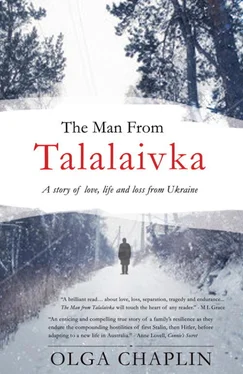He knew what they must do, and immediately. Already medical supplies, and surgeons, were being rushed west and north in Stalin’s empire to cope with the carnage of the continuing battles against Hitler’s advancing armies. There was little point in heading to the nearby makeshift clinic, some ten kilometres hence: it was already stripped of any remaining medical supplies and abandoned by the staff, who were hastily transported westward in the direction of Kiev, where fierce fighting was taking place at this very time. Their only hope was the large hospital at Romny, thirty kilometres from their kolkhoz. Every hour counted, both for their sickly child, and as the military situation deteriorated.
Dawn was barely breaking as Peter readied his tired, trusty horse and secured the cart that would carry Manya. He had spoken to the elder, and clasped Vanya’s hand, leaving little Mykola still sleeping. Evdokia, quietly weeping as she dragged pillows to the cart for Manya, glanced at Peter through her tears. She tried to stay calm. He looked convincingly in control, assured. She consoled herself. He would ensure their little firstborn would soon be well again.
They made their way in the grey morning light past the fields that had shown so much joy and promise only hours earlier. The haystacks, uneven and ghostly grey in the dim light, evoked a sense of foreboding, as though a grim reaper had cloned itself over and over in warning to unsuspecting passers-by. The sunflowers, so ripe and heavy, and ready for next day’s harvesting, stooped helplessly, hiding their faces with tears of morning dew. Evdokia’s own distress held Peter back from revealing his worst fears. The Romny hospital was their only hope. But it, too, may have been depleted of supplies and surgeons, on Stalin’s orders. Ukrainian lives were, in the tyrant’s estimation, always expendable. His orders of ‘ruthless priorities’ subjected everyone, regardless of their creeds, to Stalin’s needs. Peter realised that Evdokia, so politically unaware of these things, did not need to suffer unnecessarily.
Evdokia glanced again at her husband, his attractive face outlined against the lightening grey of the new day. She remembered the gift she had readied for Manya. Her firstborn will be nine within days. She calmed herself, in the certainty that Manya would return well again, and even run to the farmhouse for her little trinket.
Their old horse passed another grey haystack, another clone of the grim reaper eyeing them menacingly. Evdokia shuddered, as her childhood superstitions surfaced. Those same malevolent spirits hovered over, and followed them, as they left their kolkhoz fields and turned westward, in the direction of Romny.

Chapter 19
Aharried soviet official checked Peter’s papers, then hastily waved him through the hospital gates, his instructions drowned by another squadron of heavily-laden Russian bombers heading to Kiev. Military trucks followed Peter’s cart, their engines growling impatiently. Evdokia, too anxious for Manya’s deteriorating condition, did not understand the commotion in the hospital grounds, as soldiers shouted orders. Peter’s heart sank. There was an air of haste, confusion and panic as hospital staff hurriedly loaded medical supplies, and soldiers and soviet workers lifted heavy machinery into the waiting trucks.
Stalin’s Committee on Evacuation, hastily formed just days after Hitler began his invasion of Russia, had its desired effects: workers did whatever was required of them, now with patriotic zeal to save the Motherland, regardless of the human sacrifice. These medical supplies were heading westward and northward, to Kiev and Leningrad; every piece of heavy equipment that could be moved, was being transported east, to the safety of the Ural Mountains and Siberia regions. Romny was not a major centre, but was still required to give all it had to Stalin and Hitler’s war. “O God!” Peter cried silently as he steeled himself, his earlier hope of the hospital’s capacity to save little Manya now tempered with the realisation that they may have arrived too late.
The desk attendant looked fleetingly at them, at Manya in Peter’s arms, and pointed to a grubby lounge nearby as he continued his telephone conversation. “No, no, we cannot take them…. Don’t bring them here,” he pleaded, his voice resounding to the high ceiling of the grand old room that had once known nobility. He shook his head, carefully placing the telephone back on its cradle. “It is not possible…” he murmured, as if to himself, “soon there will be no-one here for the sick.” He sighed, then beckoned Peter and Evdokia to follow him, his shuffling club foot excusing him temporarily from the compulsory army call-up that Stalin’s directives required.
The old doctor, seasoned with the experience of revolution and political upheavals, remained calm as he inspected Manya’s wound. Evdokia, relieved at help being administered to her child at last, stood quietly crying, oblivious of the surroundings. Peter’s heart sank further. The ward was almost devoid of any medical equipment, the few remaining beds unused. The doctor, though kind and attentive, was hesitant, unhurried, as if he already knew he could do little for their child. Nursing staff stood back, patiently awaiting the doctor’s decision. At last, they placed Manya on a long trolley that would serve as an operating table and wheeled her to the operating room. The old doctor looked sadly at Evdokia as she wept and said gently, “We will do all we can to make your little daughter well… as you can see, the war priorities… there is very little here.”
Hours of waiting became blurred for Evdokia, as she leant on Peter’s shoulder for support on the grubby lounge in the large reception room. From somewhere, she was handed some soup and hard rye bread, the strong smell of the onion broth reminding her she had not brought food for their journey. She forced herself to sip the soup, for some sustenance, watched as her husband ate his meal thoughtfully, even heartily. She comforted herself that he would need that strength to guide them and Manya home once their little child had recovered.
Shafts of late afternoon sun pierced through the high windows of the great old room, waking Evdokia and Peter from a fitful sleep as the old doctor approached them. He spoke quietly, cautiously. They could now see their little daughter. She had survived the operation, but she was still fighting a fever. Evdokia took heart that her little daughter was safe. But she could not see, through her tears of relief, the grave look he gave Peter. Both men knew there were no miracle supplies left to fight infection and septicaemia.
Manya, pale and feverish, eyelids flickering as she murmured in pain, became aware of her parents’ presence. They waited at her side, praying separately and silently into the night. In the dimness, the familiar smell of candle-wax and wispy smoke effused a church-like aura on the bare surroundings, which hid the harsh reality. At one time in the despairing hours, Evdokia remembered the gentle tones of a long ago lullaby she had sung to her Manya. Clasping hope as she stroked Manya’s limp hands, willing them to recovery, she whispered her comforting lullaby kaska: “Sleep quietly now, little kukla, for when you wake the day is full of play once again…” She stopped and held back a sob as Manya’s face contorted. The pain had become too much for the child. Staff, like mute and ghostly figures in white garb, moved back and forth in the night, administering whatever they could to abate her pain and fever. In the abyss of the darkness, Manya had a moment of clarity and tried to raise herself, calling out, “Mama, Mama, why did you bring me here? Take me home, Mama, please, take me home.” Evdokia broke down, wept inconsolably. Nurse and husband comforted her, removed her as more local potions were administered to ease the child’s fever and pain.
Читать дальше













